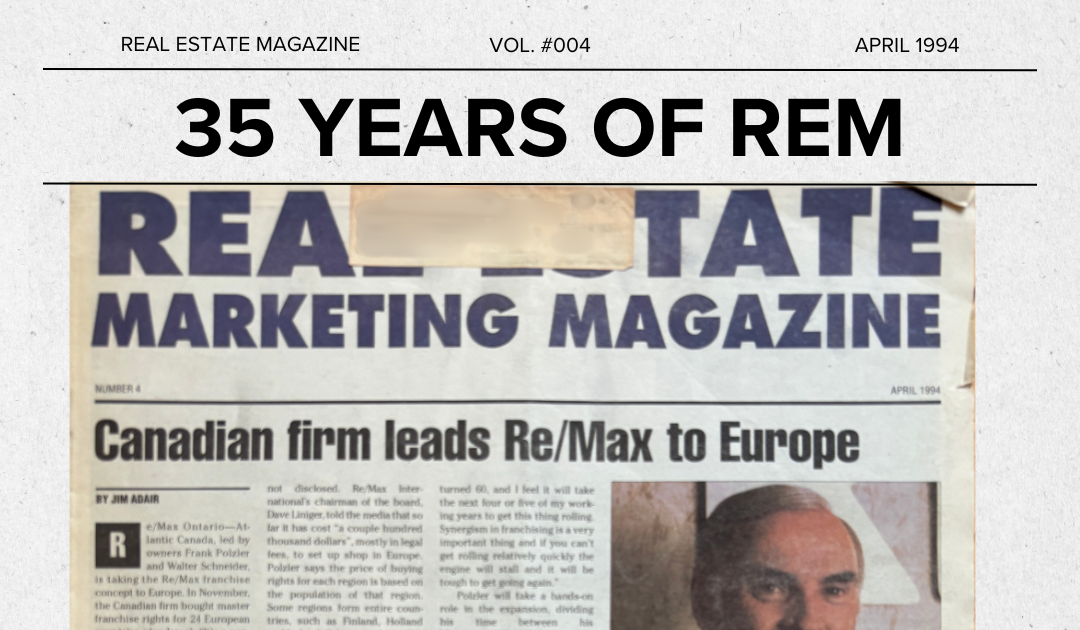To mark 35 years of Real Estate Magazine, we’re sharing articles from past issues. This article appeared in issue #004 in April 1994. It was written by REM’s Founding Editor, Jim Adair.
Re/Max Ontario–Atlantic Canada, led by owners Frank Polzler and Walter Schneider, is taking the Re/Max franchise concept to Europe. In November, the Canadian firm bought master franchise rights for 24 European countries plus Israel. “It’s a consumer market of 390 million people, stacked in an area the size of the northeastern United States, Canada, and Quebec,” says Polzler.
The co-owners are currently marketing regional franchises in 16 Western European countries. They plan to begin marketing the Eastern Block regions in 1998, although Polzler says two groups of investors are already expressing interest in Poland. He says deals are almost complete for regional franchises in Israel, Austria, France, Germany, Greece, and Spain.
The cost of purchasing the master franchise from Re/Max International, based in Denver, was not disclosed. Re/Max International’s chairman of the board, Dave Liniger, told the media that so far it has cost “a couple hundred thousand dollars,” mostly in legal fees, to set up shop in Europe.
Polzler says the price of buying rights for each region is based on the population of that region. Some regions form entire countries, such as Finland, Holland, and Ireland. Other countries with larger populations are divided into several regions (France, for example, has three). “It will take substantial investment to make this thing work,” says Polzler. He says it could cost up to $10 million in total “by the time we are up and running.”
Re/Max is not the first North American real estate franchise to make a move to Europe—Century 21 and Realty World have established European offices. However, the Re/Max Ontario–Atlantic Canada plan is the most ambitious and aggressive expansion attempt.
“It’s exciting, but it is a little scary because of the size of the project,” says Polzler. “I just turned 60, and I feel it will take the next four or five of my working years to get this thing rolling. Synergism in franchising is a very important thing, and if you can’t get rolling relatively quickly the engine will stall, and it will be tough to get going again.”
Polzler will take a hands-on role in the expansion, dividing his time between his Mississauga, Ont. offices and the new European headquarters near Zurich, Switzerland. Re/Max Ontario–Atlantic Canada already has a lot on its plate, controlling sales territory in Ontario, the Maritime provinces, and nine U.S. states (Minnesota, Wisconsin, Indiana, and several in New England).
Altogether, the company has 450 offices and about 6,700 sales reps, making it Re/Max International’s largest sub-franchisor even without Europe. Polzler, who is originally from Austria, says selling real estate in Europe is much different than it is in North America. “About 70 percent of all real estate trades in central Europe are private,” he says.
“From our point of view, the real estate industry there is very backward. There are few real estate organizations and few large brokers. There are no real estate boards. The brokers have some listing exchange information, but the industry itself is not well organized.” He says there’s also a strong mistrust of real estate people, who “have not provided service and integrity.” To combat the negative perception, Re/Max plans to combine a strong code of ethics with heavy marketing programs to educate the public about the advantages of using an agent.
Other key North American concepts to be introduced include training and ongoing educational programs for agents and brokers, a regionalized computer listing system, and management information systems. “We don’t want to ‘North Americanize’ the European marketplace. We want to leave some of the local practices in place but modernize them.”
Major changes to the European community’s economic structure are prompting much more relocation and are opening the door to entrepreneurs, Polzler says. He’s using his experience in Canada as a guide to planning European expansion. He says 20 years ago, about 60 percent of the Quebec real estate market consisted of private sales. Now, he says, that’s dropped to about 25 percent. He also says marketing is critical. “In 1990, Re/Max had a market share in Greater Metropolitan Toronto of about 24 percent, and now we have a share of 32.9 percent. We attribute that to the productivity and quality of our salespeople and our ongoing promotion machine. Everyone pretty well stopped advertising during the recession. We continued our promotion and convinced the public that Re/Max is the premier real estate company.”
Polzler says Re/Max agents across the country are three times more productive than other agents. An average Re/Max agent has about 22 transactions per year, compared to the national average of seven or eight, he says.
He says another reason to expand to Europe now is because the North American marketplace is shrinking. “I think the number of transactions will shrink—just like people are keeping their cars longer, they will also keep their houses longer. The number of deals will shrink, and the number of people chasing this pie will also shrink. Thousands of people have left the industry in the last three or four years, and this will continue. Only the most productive people, using the latest technology in their operation, will succeed in the long term.
“People who can’t cut it will either become assistants to good agents, or will leave the industry. The era of the super-agent is here. Anyone who can’t do at least $70,000 to $100,000 a year will not be around in real estate in the next five or six years.”
The European headquarters in Switzerland will open April 1. Polzler hopes some regional operations will open for business in September or October.
Jim Adair is the Founding Editor of REM Real Estate Magazine. Jim retired in 2022, after 33 years at the helm.














